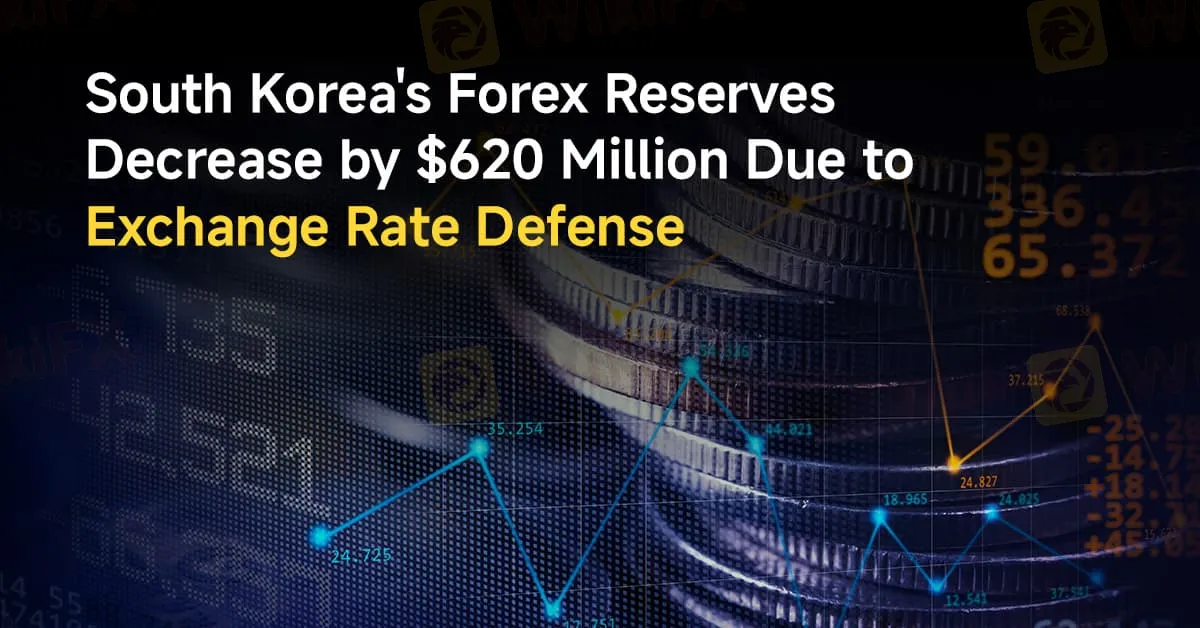简体中文
繁體中文
English
Pусский
日本語
ภาษาไทย
Tiếng Việt
Bahasa Indonesia
Español
हिन्दी
Filippiiniläinen
Français
Deutsch
Português
Türkçe
한국어
العربية
South Korea's Forex Reserves Decrease by $620 Million Due to Exchange Rate Defense
Abstract:As of the end of May, South Korea's foreign exchange reserves were ranked 9th globally, reflecting its robust position in international markets despite the recent adjustments.

As of the end of May, South Korea's foreign exchange reserves were ranked 9th globally, reflecting its robust position in international markets despite the recent adjustments.
South Korea's foreign exchange reserves experienced a decline of $620 million in June, influenced by various financial activities aimed at stabilizing currency exchange rates. According to the Bank of Korea's “End of June 2024 Foreign Exchange Reserves” report released on the 3rd of July, the country's reserves stood at $412.1 billion by the end of June, marking a decrease from the previous month.
The reduction in reserves can be attributed to several factors. Despite an increase in foreign currency deposits at financial institutions, primarily driven by the typical end-of-quarter effect, significant outflows were observed due to the repayment of foreign exchange stabilization bonds (FESBs) and foreign exchange swaps with the National Pension Service. Additionally, the appreciation of the U.S. dollar contributed to a decrease in the converted value of non-dollar foreign currency assets.
The Bank of Korea clarified, “The decrease in reserves was largely due to the maturity of FESBs and the settlement of foreign exchange swaps, coupled with the impact of a stronger U.S. dollar on the valuation of our foreign currency holdings.”
However, the central bank reassured that this decline is temporary, anticipating a reversal with the issuance of new FESBs scheduled for July. This issuance is expected to bolster reserves in the upcoming months.
The management of foreign exchange reserves plays a crucial role in South Korea's economic strategy, ensuring stability and resilience against global financial fluctuations.

Disclaimer:
The views in this article only represent the author's personal views, and do not constitute investment advice on this platform. This platform does not guarantee the accuracy, completeness and timeliness of the information in the article, and will not be liable for any loss caused by the use of or reliance on the information in the article.
Read more

WikiFX “Elite Night · Bogotá” Concludes Successfully
Yesterday, WikiFX Elites Club’s exclusive cocktail party—“Elite Night · Colombia”—was successfully held in Bogotá, the capital of Colombia. As a key part of WikiFX’s global strategic layout, this event brought together top IBs, industry KOLs, and trading elites from across Latin America to discuss forex market trends, explore new opportunities for industry collaboration, and build high-end networks and a value-driven ecosystem.

Rising Tensions Push Oil Prices Higher
Fresh Middle East conflict sends shockwaves through energy markets.

Why Your Stop Loss Keeps Getting Hit & How to Fix It
Many new traders run into the same frustrating problem. They analyse the market, place a trade, and watch the price go against them just enough to hit their stop loss. Then, like a bad joke, the price moves exactly in their predicted direction. Read this article to learn how to fix this issue for good!

Safe-Haven Surge: Gold Shines Amid Market Turmoil
Rising geopolitical tensions fuel a flight to safety, propelling gold past key resistance and positioning it as a top-performing asset in today’s volatile market.
WikiFX Broker
Latest News
Why Your Stop Loss Keeps Getting Hit & How to Fix It
Should you buy or sell US dollars in the next three to six months?
IronFX Review 2025: Is This Broker Trustworthy or a Scam?
Exclusive Markets MT4 and MT5 Review 2025
Corsa Futures Review 2025: Read Before You Trade
WikiFX “Elite Night · Bogotá” Concludes Successfully
Rising Tensions Push Oil Prices Higher
Oil price trends are worrying, and the market faces multiple challenges.
Currency Calculator


